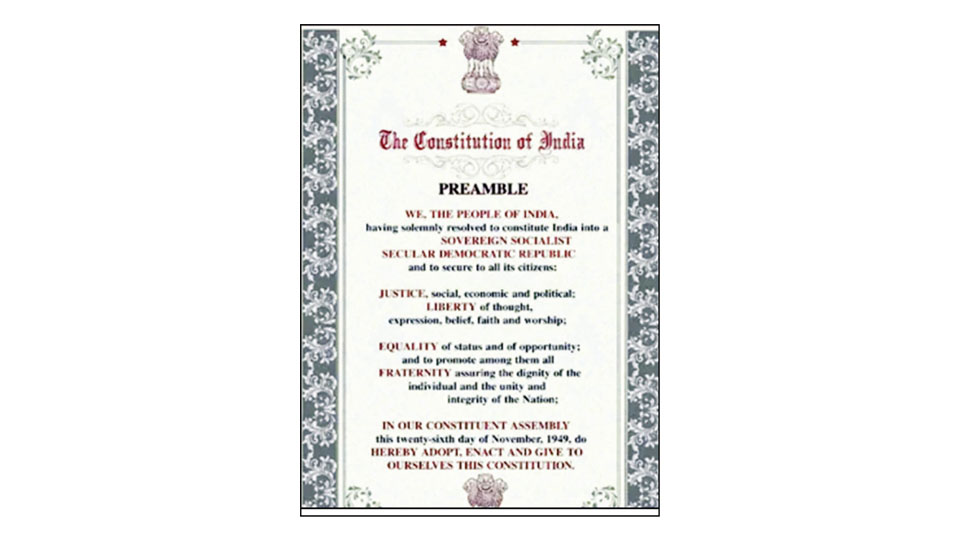


The Supreme Court has rejected three petitions seeking to delete the words 'secular' and 'socialist' from the Preamble of the Constitution of India. The Court stated that the power to amend the Constitution extends to the Preamble and that the words were inserted in 1976 during a national emergency. The Court also clarified that the terms 'secular' and 'socialist' do not restrict economic policies and reflect the State's commitment to equality and welfare. The petitions were filed by former BJP leader Subramanian Swamy, advocate Ashwini Upadhyay, and Balram Singh.
Supreme Court Rejects Challenges to 'Secular' and 'Socialist' in Constitution's Preamble
The Supreme Court of India has dismissed three petitions seeking to delete the words "secular" and "socialist" from the Preamble of the Constitution. This landmark decision protects the foundational principles of the Indian Constitution and reaffirms the nation's commitment to a secular and egalitarian society.
Background
The Preamble to the Indian Constitution was adopted on November 26, 1949. It encapsulates the fundamental principles and aspirations of the Indian people. However, in 1976, during the Emergency declared by Prime Minister Indira Gandhi, the words "secular" and "socialist" were inserted into the Preamble. These amendments were challenged by critics who argued that they violated the basic structure of the Constitution.
Case Proceedings
The recent petitions seeking to remove the disputed terms were filed by former BJP leader Subramanian Swamy, advocate Ashwini Upadhyay, and Balram Singh. They contended that the words "secular" and "socialist" were alien to Indian culture and restricted economic policies.
The Court, however, rejected these arguments. The judges held that the power to amend the Constitution extends to the Preamble and that the disputed terms had been legitimately inserted during a valid national emergency.
Court's Reasoning
The Court emphasized that the terms "secular" and "socialist" do not prohibit free market policies or economic development. Instead, they reflect the State's commitment to equality, welfare, and the separation of religion and state.
The Court clarified that the word "secular" guarantees religious freedom and prohibits discrimination based on religion. It does not mean that India is an atheist state but rather that all religions are equally respected and protected.
Similarly, the Court explained that "socialist" signifies the State's responsibility to ensure social and economic justice for all citizens. It does not imply a specific economic ideology but rather a commitment to a fair and equitable society.
FAQs
Q1: Why were the words "secular" and "socialist" added to the Preamble? A1: They were added during the Emergency in 1976 to reinforce the principles of equality, welfare, and separation of religion and state.
Q2: Does the term "secular" mean that India is an atheist state? A2: No, it means that India is not affiliated with any particular religion and that all religions are treated equally.
Q3: Does "socialist" imply a specific economic ideology? A3: No, it reflects the State's commitment to social and economic justice for all citizens, regardless of their economic status.
Q4: Can the Preamble be amended? A4: Yes, the Preamble is part of the Constitution and can be amended through a special procedure involving a two-thirds majority in Parliament.
Q5: What does the Supreme Court's decision mean for the future of the Indian Constitution? A5: The decision affirms the Court's commitment to preserving the basic structure of the Constitution and the fundamental principles enshrined in the Preamble.

Prime Minister Narendra Modi accused the Congress party of sowing the seeds of division through the omission of important stanzas from the national song Vande Mataram in 1937. Speaking at an event to commemorate 150 years of Vande Mataram, Modi highlighted the importance of the song in India's struggle for independence and its relevance in every era. He also invoked Bankim Chandra Chattopadhyay's vision of a prosperous India and praised the country's resilience against foreign invasions and colonial policies.

In a speech at a BJP office event celebrating the 150th anniversary of Vande Mataram, Chief Minister Mohan Yadav accused the Congress of linking the patriotic song to religion and causing the partition of India. Yadav argued that the song symbolises three Hindu goddesses and that Prime Minister Narendra Modi has given it a new form. However, the Congress did not participate in any events for the occasion.

Maharashtra Chief Minister Devendra Fadnavis has initiated an inquiry into a Pune land deal involving Parth Pawar, the son of NCP chief Ajit Pawar. The move comes amid allegations of corruption and irregularities against Parth, who is seen as a rising political figure in the state. As Parth's public profile grows, observers suggest that his political statements and actions may be reflective of his father's shifting alliances and strategies.

At the state-level inauguration of the 'Vande Mataram: 150th Smaranotsav Ceremony' in Bhopal, Chief Minister Mohan Yadav emphasized the importance of the national song and its role in igniting the flame of freedom in the hearts of millions of Indians. The event, attended by top officials such as DGP Kailash Makwana and Bhopal MP Alok Sharma, featured recitation of the National Song and a band performance by the state police. This ceremony, organized in all 55 district headquarters across Madhya Pradesh, was hailed by Chief Minister Yadav as a prime example of Prime Minister Modi's commitment to national patriotism and preserving heritage.

Maharashtra's deputy chief minister Ajit Pawar met with chief minister Devendra Fadnavis on Friday amidst a controversy surrounding a Rs 300 crore land deal by a company linked to Pawar's son. The Maharashtra government has ordered a probe into the deal and suspended two revenue officials. Opposition parties have called for an independent judicial probe and questioned whether the government's inquiry will be impartial. This is not the first time Pawar has been embroiled in a public scandal, with a previous incident involving an alleged threat to an IPS officer in August.

Maharashtra Chief Minister Devendra Fadnavis has set up an inquiry panel to investigate allegations of corruption and irregularities in the sale of government land in Pune to a company linked to NCP leader Ajit Pawar's son. The sale of 40 acres of land worth ₹1,800 crore to Amedea Enterprises LLP, where Parth Pawar is a partner, for just ₹300 crore and a stamp duty waiver of ₹21 crore has raised suspicion. The government has assured a thorough investigation and strict adherence to rules.

As India celebrates 150 years of Vande Mataram, Prime Minister Narendra Modi has accused the Congress of removing crucial stanzas from the national song in 1937, leading to the division of the country. The prime minister emphasized the significance of Vande Mataram in India's freedom struggle and called for the younger generation to understand why the song was divided. However, Congress president Mallikarjun Kharge has refuted PM Modi's claims and alleged that the BJP and RSS have historically neglected Vande Mataram and instead continue to sing their own slogan.

Prime Minister Narendra Modi launched the year-long commemoration of the 150th anniversary of India's National Song, 'Vande Mataram'. He released a commemorative stamp and coin dedicated to the song and visited an exhibition centered around its theme. The celebrations also included mass singing of the song across public spaces in India, with enthusiastic participation from citizens. The Prime Minister emphasized the significance of Vande Mataram in uniting the nation and inspiring generations.

Prime Minister Narendra Modi, in a grand event at Indira Gandhi Indoor Stadium in New Delhi, launched the year-long celebrations marking 150th anniversary of the national song 'Vande Mataram'. The event saw a mass singing of the iconic song and also featured the launch of a commemorative stamp, coin, and portal. PM Modi addressed the audience and highlighted the significance of 'Vande Mataram' in India's freedom struggle and its continued resonance with the people.

As India celebrates 150 years of its national song ‘Vande Mataram’ today, Prime Minister Narendra Modi inaugurated a year-long commemoration with the release of a commemorative stamp and coin. Calling Vande Mataram a symbol of India’s unity, PM Modi urged citizens to draw inspiration from its timeless force. He also highlighted the impact of the 1937 decision to approve only selective stanzas of the song, which he claims sowed the seeds of India’s partition. Amidst renewed political debates, the Prime Minister urged the younger generation to understand the historical context and warned against the divisive mindset that still persists in the nation.